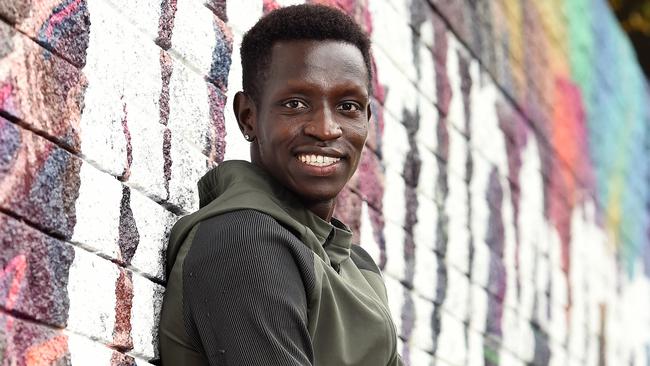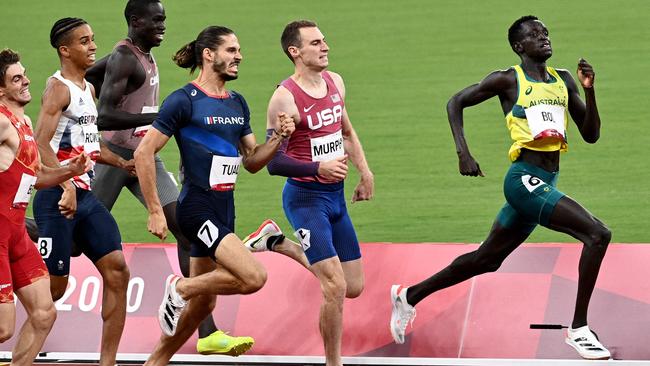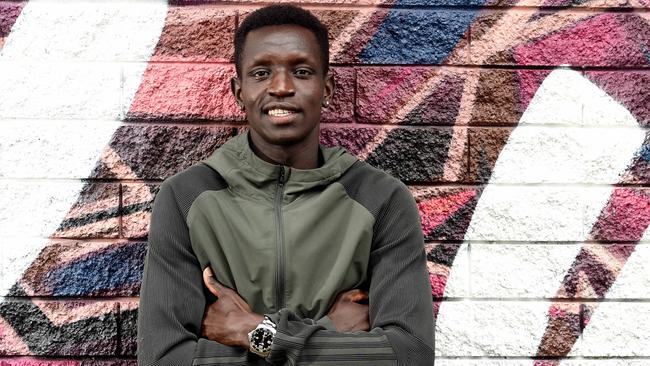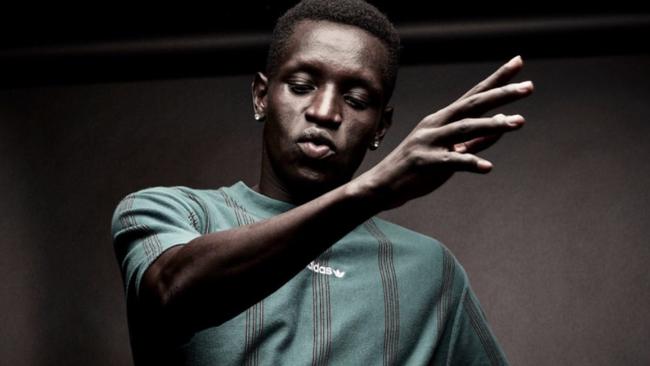Olympic finalist Nagmeldin ‘Peter’ Bol has a higher mission than running
As the first Aussie male to make the 800m Olympic final in over 50 years, Nagmeldin ‘Peter’ Bol captured our imaginations. But it was his backstory and family’s pride that captured our hearts.
Victoria
Don't miss out on the headlines from Victoria. Followed categories will be added to My News.
Nagmeldin ‘Peter’ Bol captured the imagination of the country when he ran in the 800m at the Tokyo Olympics. He was the first Australian male to make the 800m final in more than 50 years. He ran two personal bests, and two Australian records, and made us all feel something we needed at the time. He is an exceptional runner, and as I found, an incredibly thought provoking, and impressive person. We spoke about fleeing Sudan, racism in Egypt, a basketball scholarship, a running career that started from an unlikely need, celebrating as a family, and the impact he would like to have from his time on the track. Bol, who wants to use his status to make a difference and promote tolerance and understanding, believes the key for the youth of today “is to teach them it’s okay to follow your dreams and aspirations even when the world draws you away”.

HM: Nagmeldin ‘Peter’ Bol. You aren’t often called Nagmeldin?
NB: I’m not, but I like my real name! The first part of the name, Nagmel, is pronounced “Najma” and najma means ‘star’ in Arabic. The second part, ‘din’, is religion.
HM: Who called you Peter?
NB: I’m not sure initially, but we tend to have nicknames growing up and I was given Peter. I actually prefer Nagmeldin to Peter. Nagmeldin is on my passport.
HM: Nagmeldin it is then! What do you remember of your time living in Khartoum?
NB: Not much actually. I left when I was six, so I barely have any memories. I have more memories from our time in Egypt because I was a little bit older. I was in Australia by the age of 10.
HM: Your parents decided to flee to avoid the civil war in Sudan and went to Egypt. Where were you based?
NB: We were in Cairo. I remember walking to school, and playing football as a kid with my older brothers on the streets. I remember the cultural differences.
HM: Were you aware of what your parents were escaping from? Or were you protected from it?
NB: At that age you’re not aware of the conflict, and the terror that’s happening at the time. I guess your parents do a good job because they are trying to keep you away from it. You move to a different country to keep away from that stuff, you are just trying to move on, and you don’t think it’s difficult or dangerous until you have those conversations a little later, as you grow up and ask more questions. As a kid you are not aware of what’s happening, but you are aware of the cultural differences. I was more aware of conflicts in Egypt than I was in Sudan. There was quite a bit of racism in Egypt, especially towards Sudanese people. I was aware of that just by the way people treated me.
HM: So you experienced racism for the first time in Egypt? Has it ever stopped for you?
NB: No, it hasn’t really. People have different viewpoints and perspectives but it’s something that doesn’t stop. I think part of moving away from Sudan was because of the tribalism, which is similar to racism. You do notice a difference when moving from Egypt to Australia. In Egypt, racism was very open, whereas here, it’s a culture where it’s not accepted. That’s not to say there aren’t racist people, but people are scared to be racist in public because there are consequences. I don’t think racism ever stops, it keeps going, and it’s sad.
HM: How do you deal with it and prevent it ruining your day to day? I assume it affects you deeply?
NB: You do what you can that is within your control. You need to speak out, then educate and try and have a conversation. What else can you do? You’ve got to make sure it doesn’t compromise your happiness either because that’s really important. You have to find a way to let it pass by, and not hold onto it. If you take it on board, you are allowing them to have a win. And they shouldn’t be allowed to affect you, why let them win?

HM: When your parents decided to bring you to Australia, how many jumped on the plane? Did you have your four brothers and sister all there with you?
NB: No, all the brothers were with me, but my sister was born in Australia.
HM: How many English words did you know on landing?
NB: I think between us all, not one. Maybe we knew ‘hello’, but that would have been it.
HM: Wow. How brave were your parents?
NB: Brave and courageous, but it was necessary. They knew there were Sudanese families here, so trying to learn a different language is not that tough when you see the opportunities it creates. We had to, and still do, focus more on the opportunities ahead rather than the challenges.
HM: Great perspective. I guess the opportunity was evident, and the consequences of staying were dire.
NB: That’s right, and to get the best opportunities, meant risk and effort and sacrifice. It’s like anything in life generally. Even with athletics, you try to be the best in the world, and to do that, you must sacrifice a lot of things. You are not really looking at the sacrifices, but the opportunities. You tend to have a positive outlook on it, and moving over was a positive choice.
HM: How did you end up at St Norbert College?
NB: I went and applied at the school for a scholarship. I was interested in basketball, and I knew they had a basketball program. A year later I was offered a basketball scholarship.
HM: Who introduced you to basketball? How did you become so proficient?
NB: I used to watch it on TV, and loved watching different players. Back home, especially in Egypt, it was all soccer, but when I came to Australia, there are new lenses. There’s football, there’s basketball, there’s everything. That’s when I was introduced to the NBA.
HM: Who do you support in the NBA?
NB: The Lakers, and I always followed Kobe Bryant. Kobe was unreal, on and off the field. He was just an amazing person.
HM: Did you know you could run fast before you were asked to run in the 400m and the 800m at the athletics championships? Were you at St Norbert’s when that happened?
NB: Yep, I did, but for me running wasn’t really a sport. I had always known I could run when fit, but back then, I didn’t see running as a sport. It was just a foundation for me to become better at sport, just like English is a foundation for every other subject at school.
HM: How did the conversation go at school? Who was the teacher . . . that said ‘Peter can run!’.
NB: I remember the teacher because I keep in touch with her. Helen Leahy. She was my head of house, and athletics was compulsory at school, so I had to run in the school carnivals.
HM: Ms Leahy said, ‘we need someone in the 400m’ didn’t she?
NB: Yes, she did. And one of the students said ‘Peter can run’, so I did. I was in year 9. I won most of the races. I started in cross country, and I was winning cross country at school quite easily.
HM: You went and ran the 400m, you won by 80m, and then they needed someone to run the 800m, and you won that by 100m.
NB: I did win them easily … I won the long jump, I won the high jump, and I was winning all the events really. The only events I wasn’t winning were the strength events, shot put and discus. I was winning everything else.

HM: That was all in Year 9, in 2009. And four years later, in 2013, you won the junior 800m title in 1:48.90.
NB: Yep.
HM: As they say ‘that escalated quickly’.
NB: Yeah. I was new to the sport, and then with a little bit of training and consistency, I improved quickly.
HM: When did the Olympics in Rio become a possibility?
NB: I decided to move to Melbourne in 2015, and 2014 is when I decided the Olympics was a good target.
HM: How do you continue to shave so much time off? I get it initially, you keep getting fitter, learning how to run the race strategically. When you get to your level now, how do you go from 1:44.11, to quicker?
NB: A combination of fitness, which requires strength and endurance, gym and pilates, they are the physical components, and then there is the mental part, the self-confidence, the belief, the understanding, and the self-awareness. You have another branch which is your support team, I call them the ‘Triple J’s’. Justin Rinaldi, my coach, who sets all the training programs, you have James Templeton, my manager who sets all my races overseas, and then Joseph Deng, who’s my training partner, a familiar face who I travel the world with. We compete against each other. We are one and two in Australia, so to have that competition right at home, not having to travel across the world all the time, is important. It’s a combination of the physical part, the mental part, and the support team. You’ve also got to enjoy it, have fun, and not think about it too much.
HM: Your team seems very close. If you get everything right, as best you can, what is possible in terms of a time for Peter Bol?
NB: 1:42s. I’d like to think I was in high 1:42 shape last year. I was definitely 1:43 shape, crossing the line and slowing down in the semi finals. I’d like to chase 1:42 and dream bigger than that. I have stopped worrying too much about times. Times come and go, but championships and records stay with you forever. If we learnt anything from Tokyo, it was the final wasn’t won in the fastest time. The semi final and the heats were faster. It’s about being able to run your best in those championship races. I prefer to chase medals than times.
HM: Did you realise that about one in eight Australians were watching you run as the first Australian to run in an 800m Olympic final in more than 50 years? Could you understand what you’d done for the Australian publics mood, or were you oblivious to it.
NB: My family showed me stuff, and I was quite active on social media, but I was super calm. I needed to be. You understood that you needed to create the hype, create the support, but you need to stay focused at the same time. That’s the approach I took. After the games I was able to go out into the public and thank them for their support. During the games, where a race only goes for one minute and forty four seconds, you need to embrace everything around you, but stay focused on the main task. I did that really well.
HM: I read your mum was so nervous that she couldn’t watch the Olympic final. Is that true?
NB: Yes. In some of the TV footage you can’t see her, she was too nervous for her boy. But there were a lot of nervous people. It would be so tough as a parent to watch an Olympic final, especially if you knew how far we’d come. Those people, my family, coaches, manager, it would have been a long day for them … the race was at 10pm.

HM: Has there ever been more people in one living room in the Bol household?
NB: I think so! The best thing about Tokyo was it brought out our culture, to life. That’s how we celebrate each other. Even if it’s my nephew’s little birthday, there’s plenty there. That’s the culture. You move to Australia, you embrace the culture, but never forget yours. In our culture we value family as you saw at the games, and we value success, achievements, and above all, each other.
HM: How hard is it to be away from your family, who seem so close, to pursue your dream?
NB: It’s been extremely hard, and still is, but it’s made us closer. I get back three or four times a year. Sometimes I go there for two months, sometimes two weeks, so I do get to go back home and see them.
HM: Did you leave Tokyo satisfied?
NB: Yes, and no. Performance wise, it was mixed emotions. In the final, and don’t get me wrong, fourth in the world is great, but we wanted to win medals. Impact wise, I was satisfied. We have created so much impact, not just around Australia, but around the world, on and off the track. There were messages across social media, school kids sending letters, emails, and all these people trying to get in touch with you. I was satisfied in that sense, but performance wise, we’ve still got some work to do.
HM: When you go to Paris in 2024, assuming you aren’t injured, should you be a better runner given your experience, or does age play a factor? Do you have a sense whether or not you’ll be peaking at any particular time?
NB: The beauty of that question, is we will never know until Paris comes. Ideally, I’d be a better runner. I’ve got more experience, but there are so many factors that can play into Paris. We tend to focus on the day to day. We focused on nationals, we ticked that off, and now we’ve got Doha coming up in a month. Then we’ve got the World Championships and the Commonwealth Games. Let’s focus on those before even trying to focus on Paris. Why not try and get medals here in case Paris doesn’t happen? Focus on the present.
HM: I understand you do a lot of reading. Is that true?
NB: When I get time.
HM: Are you always reading something?
NB: I haven’t picked a book since Lost Connections, but yes. I’m always trying to read something, especially when I’m overseas. With running you have a lot of spare time on your hands, especially when you’re overseas. I read to learn about different people, different cultures, and how the world works. When you are overseas, it’s a lot easier to go outside and engage with people and learn from them. I come from so many different cultures. My parents are both from different tribes. One of the most common questions I get is, ‘where are you from?’ I was born in Sudan, relocated to Egypt, I live in Australia, and my parents are in two different tribes. You combine all those different cultures together and you learn a lot of different things.
HM: You listen to a lot of podcasts and TED talks.
NB: I loved Bryan Stevenson’s. I read his book, Just Mercy. I like what he said ‘we all have a responsibility to create a just society’. That really resonates with me as I’m in a great position to create positive change and speak stand and speak for those that can’t. That was a really good book, about understanding the justice system in the U.S., people being imprisoned for a long time for small crimes, and the difference between having money and not having money in the legal system. You realise that you are so privileged to be in Australia.

HM: I’ve heard you say it’s important to keep your voice. You’ve got a very strong voice now in this country, what do you want to say?
NB: It is important, and the challenge will always be to speak out, not just for yourself, but for other people. Speak out for what you believe in. To make the world a better place, a nicer place. People need to be nicer to each other, despite our race, cultures, anything. People need to be good to each other, and when they aren’t, need to be able to stand up and ask why? Understand that it’s okay to have differences.
HM: Have you been back to Sudan since you left?
NB: I haven’t, but my mum always goes, and I am planning to this year.
HM: Amazing to go to the Olympics, run three times, two PBs, two Australian records, and fourth in an Olympic final. So many people go and can’t handle the environment. Nice that it all came together.
NB: What was extra special was for the country to get to know my character outside of the track and the platform the games provided. It came together for my support team and that was special because I didn’t make it on my own and it was great to read so many papers and news reports acknowledging those who played a crucial part
HM: 800m. How much of it are you in pain?
NB: I’m only in pain for the last 200m to 100m, if it’s run properly. But that also depends on your shape … If you’re in pain in the first 400, then it’s going to be a very painful second lap, but I’d like to think that we judge when it’s the right time to race pretty well. Credit to my coach of course.
HM: What do you feel?
NB: The lactic acid, your legs just get heavier and heavier. When I ran those Australian records, they were the most comfortable races I had. You are just flowing, moving with it.
HM: I have heard you say when you are in the zone, everything around you is blurred. The focus is on you, you feel unstoppable. It’s peaceful, like meditating. You’re not thinking about anything, that’s when you run your best. You’re so present.
NB: With those two Australian records, I even had time to slow down! You are in the zone. It’s what you train for, it all coming together. The challenge with the 800m is trying to put everything together on competition day. You can get it together so many times during training where you feel amazing, but the challenge is to bridge that gap between competition and training, to always feel the same. If you are not nervous at training, why are you nervous at competitions?
HM: How do you do that?
NB: Training, trial and error, breathing, staying in the zone, and trying different things. I’ve been nervous at training and I’ve still run well, so let’s run anyway. I was nervous for Brisbane on the weekend. I thought, let’s just run the first 400m, the same way I want to run it, regardless of how nervous I am, and the rest will take care of itself. I did, and ended up winning easily. So in a sense having the courage to follow through your plans even when you don’t feel up for it is the difference between great performance and average.
HM: What do you want to do when your running is done? You seem like the sort of guy that could do anything.
NB: I want to start my own foundation on mixing education and sports together. Inspired by something like the Bachar Houli Foundation. I have done workshops with these kids, and I like the foundation and what they stand for. I’m also interested in business and see myself following that path.

HM: Does that give you great joy, helping the youth of today?
PB: 100% per cent We all are a little bit lost, we need guidance. If we can give it, then why not? It does give me joy. Kids tend to listen to people that they perceive as successful. You have good advice at home, but I always went to YouTube to find Kobe Bryant, or Muhammad Ali, for inspiration. We just perceive them as much more successful.I think the key for our youth today is to teach them it’s okay to follow your dreams and aspirations even when the world draws you away.
HM: You are the fourth quickest 800m runner in the world at the Olympics. Do you get enough financial support to be able to focus all of your energies on running now?
NB: I didn’t before, but that worked to my advantage. I picked up so many different skills early on. I picked up leadership skills, speaking engagements in my early career, and from 2014, that built up. When Tokyo came, I was a well-established speaker, and now I am able to speak to corporates. I did a lot of coaching, I have worked in different places, and so if I ever need a different job, I have experience. It was initially a lot harder, but there’s so much value in staying in the sport, because you get to travel the world, you get to challenge yourself, and if you can run that fast, and keep breaking PB’s, you just follow that same process later on in life. We are always looking to find new sponsors, support teams, but they need to be in line with our values. Our brand needs to stay strong, and we have to stick to our values and be true to ourselves.
HM: You do a lot of talks to kids and others – what is the theme?
NB: With the rise of Covid, wellbeing is big. Leadership is another big one, and motivation and resilience. I share a presentation in my spikes, because my spikes have taken me all over the world.



